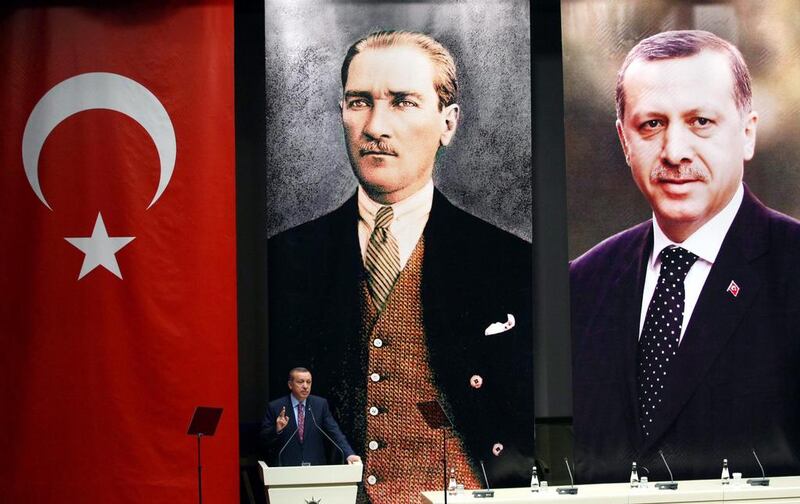Like many of Turkey’s leading politicians, former president Abdullah Gul is full of contradictions. One of the founding members of the ruling Justice and Development Party (AKP), Mr Gul was largely overshadowed for much of his term by then prime minister Recep Tayyip Erdogan.
Since leaving office, Mr Gul has transformed himself into a man who sprinkles words of wisdom about the direction of the country. Many now want to see him return to the political arena as a counterweight to Mr Erdogan.
Recent events give the impression that Mr Gul is paving the way for his return. After an iftar meal with Mr Erdogan last week, Mr Gul delivered a post-dinner speech in which he targeted Ankara’s ailing regional policies.
“To be frank, I think it would be beneficial to review our policies in the Middle East and the Arab world with a more realistic approach,” Mr Gul said.
Appearing to mock prime minister Ahmet Davutoglu’s oft touted “zero problems with neighbours” approach to Turkish foreign policy, which received many accolades in the build-up to the 2011 Arab revolutions, Mr Gul said Turkey must regain its position as an “inspiration” for the region and redevelop its ties to countries in the Eastern Mediterranean, specifically Egypt.
It is unclear whether Mr Gul will act on these fresh ideas concerning Turkey’s regional position. What is clear is that he has raised several crucial points and the Turkish establishment could easily heed his advice.
Take ISIL. Turkey shares a long and porous border with Syria, and thanks to Mr Erdogan’s aggressive stance towards Bashar Al Assad, Ankara has turned a blind eye to thousands of jihadi fighters pouring into Syria over the past four years.
Mr Erdogan’s government has been correctly chastised for failing to take a harder line against the militants. Recent events signal a small change.
Last week, Ankara launched a crackdown on ISIL’s recruitment network inside Turkey. The operation netted 18 Turkish nationals and three foreigners. Earlier this month, in the border city of Gaziantep, Turkish forces arrested 45 foreign nationals.
The ease with which Turkish forces were able to arrest the militants is largely thanks to the elaborate domestic surveillance network the government has at its disposal. In other words, if Turkey wants to hamper ISIL’s critical operations in Turkey, it can do so with ease. It is only a matter of political will.
A progressive approach to the ISIL menace would certainly raise Turkey’s stock. Mr Erdogan and Mr Davutoglu could build on the goodwill by transforming Turkey into an active partner in the US-led coalition by opening its southern Incirlik airbase to coalition war planes carrying out air strikes against ISIL militants across Syria and Iraq. Perhaps more importantly – and this is another part of a regional foreign policy overhaul – Ankara could soften its sharp rhetoric against Kurdish fighters currently battling ISIL in northern Syria.
Recent remarks by Mr Erdogan that Turkey might invade northern Syria to stop the creation of a Kurdish enclave are deeply unhelpful for the larger fight against ISIL, considering that the Kurds have proven themselves to be reliable and efficient fighters on the front lines.
Mr Erdogan’s remarks have already hurt the fragile peace process between Turkey and the outlawed Kurdistan Workers’ Party (PKK). This week, elements in the PKK announced that a shaky ceasefire with Turkey, in place since 2012, had been called off due to excessive Turkish aggression against Kurdish security positions.
Given the strong showing of the pro-Kurdish Peoples’ Democratic Party in the recent Turkish election, along with the international community’s appreciation for the Kurdish role in fighting ISIL, the Turkish government would be missing a serious opportunity to open a new chapter with the Kurds because of its excessive posturing.
Finally, Turkey must re-evaluate its relationship with Egypt. The beginning of the end of Turkey’s “zero problems with neighbours” policy can arguably be traced in part to its support of the Muslim Brotherhood in Egypt.
Recognition that the current Egyptian regime is going to stay in power, at least for the medium term, will help Mr Erdogan recapture some of the goodwill that Mr Gul claims Turkey has lost over its stubborn backing of the Muslim Brotherhood. It is what the region demands as Qatar, Turkey’s major regional ally, now fully understands.
While some of these measures can be carried out with relative ease, other issues will require broader political capital, which is in short supply thanks to the continuing headaches connected to the building of a coalition government after the AKP failed to secure a large majority in May’s parliamentary election. Again, Mr Gul has called on Mr Erdogan and Mr Davutoglu not to push for early elections because of the political uncertainty that will likely follow. It remains unclear whether his advice will fall on deaf ears.
The AKP’s dream of Turkey gaining enough political clout to shape the region according to its own desires has passed, if only for the time being. Turkey’s “zero problems with neighbours” has transformed into “nothing but problems with neighbours”, and this is largely thanks to stubborn leadership. That said, several areas remain open for Turkey to recapture the goodwill it enjoyed before the Arab revolutions. All Ankara has to do is keep the leadership’s wild ambitions in check and think hard about its long-term goals.
jdana@thenational.ae
On Twitter: @ibnezra





